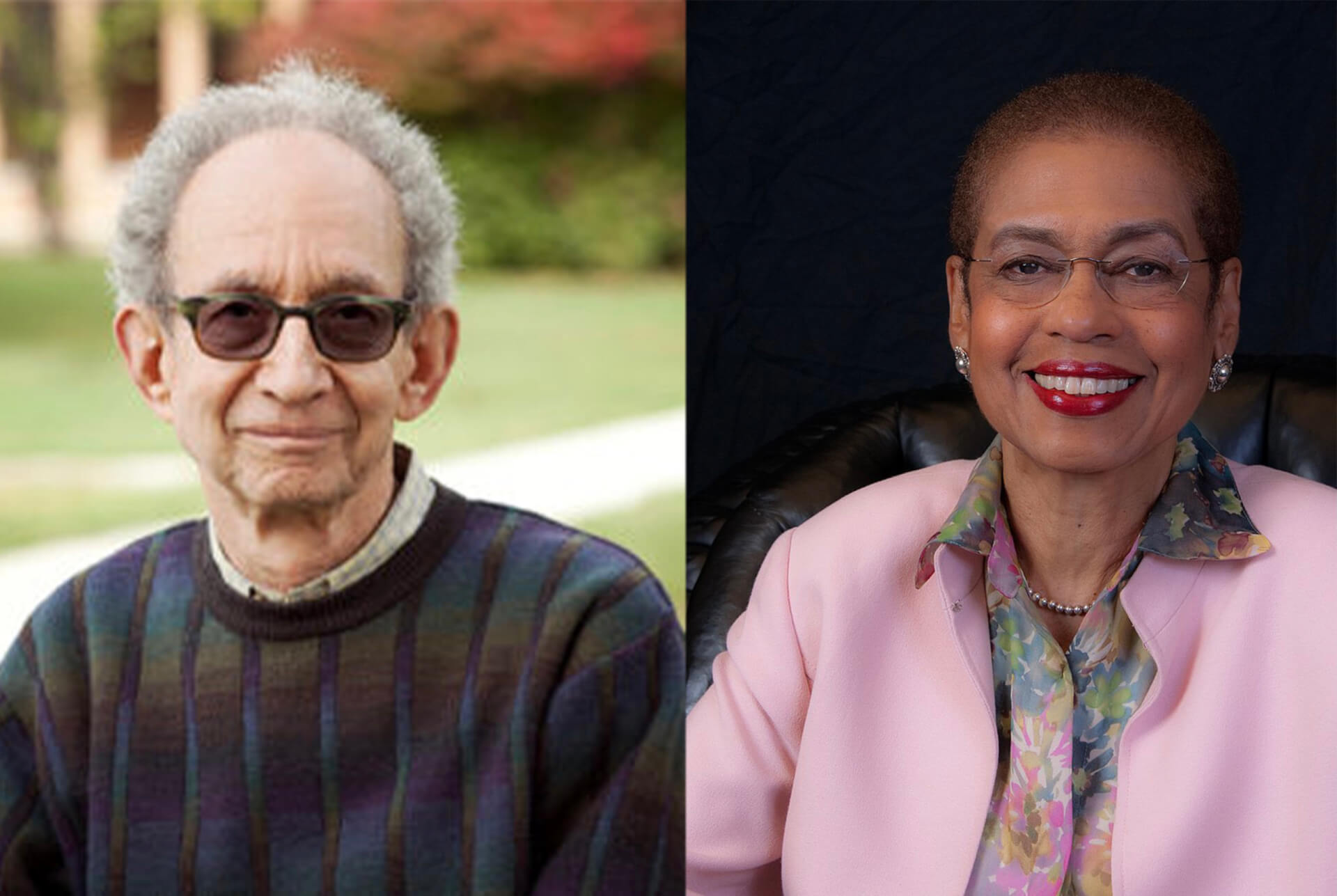
ELEANOR HOLMES NORTON ‘60 & LARRY PEARL ‘55
The ACLU of the District of Columbia recently celebrated its 60th anniversary by honoring two Antioch alumni: Congresswoman Eleanor Holmes Norton ’60 and Larry Pearl ’55.
Eleanor Holmes Norton is D.C.’s delegate to the U.S. House of Representatives, a lifelong champion of civil rights, and a previous ACLU staff member. The ACLU honored her with the Arthur B. Spitzer Lifetime Achievement Award.
The ACLU also honored Antioch alumni Larry Pearl ‘55, whose many years of volunteer service have been crucial to ACLU-DC’s legal team.
Eleanor Holmes Norton ‘60
According to Wikipedia “Eleanor Holmes Norton was born in Washington, D.C., June 13, 1937. The daughter of a schoolteacher and a civil servant, she attended Antioch College (B.A. 1960), Yale University (M.A. in American Studies 1963), and Yale Law School (LL.B. 1964).” (Wikipedia)
“While in college and graduate school, she was active in the civil rights movement and an organizer for the Student Nonviolent Coordinating Committee (SNCC). By the time she graduated from Antioch, she had already been arrested for organizing and participating in sit-ins in Washington, D.C., Maryland, and Ohio. While in law school, she traveled to Mississippi for the Mississippi Freedom Summer and worked with civil rights stalwarts such as Medgar Evers. Her first encounter with a recently released but physically beaten Fannie Lou Hamer forced her to bear witness to the intensity of violence and Jim Crow repression in the South. Her time with the SNCC inspired her lifelong commitment to social activism and her budding sense of feminism. She contributed the piece “For Sadie and Maud” to the 1970 anthology Sisterhood is Powerful: An Anthology of Writings From The Women’s Liberation Movement, edited by Robin Morgan. Norton was on the founding advisory board of the Women’s Rights Law Reporter (founded 1970), the first legal periodical in the United States to focus exclusively on the field of women’s rights law. In the early 1970s, Norton was a signer of the Black Woman’s Manifesto, a classic document of the Black feminist movement.” (Wikipedia)
A former Antioch Trustee, Eleanor Holmes Norton is a member of the U.S. House of Representatives for the District of Columbia. She has held this office since 1991. Before coming to Congress, she was a tenured professor of law at Georgetown University Law School where she continues to teach one course every year. Before being elected, she also served on the Rockefeller Foundation board, the boards of three Fortune 500 companies, the Board of Governors of the D.C. Bar Association, and the boards of several civil rights and other national organizations. She has also been a Senior Fellow at the Urban Institute and Assistant Legal Director of the ACLU. She was named by President Jimmy Carter as the first woman to chair the Equal Employment Opportunity Commission and, before that, the first woman to chair the New York Commission on Human Rights. Eleanor is a third-generation Washingtonian.
She was a history major at Antioch but started in pre-med because her father wanted her to become a doctor. She switched to History due to her political activity and interest.
Eleanor is the subject of “Fire in My Soul”, a biography written by Joan Steinau Lester ’62 – an award-winning commentator, syndicated op/ed columnist, and well-published author.
In 1980 she was Commencement Speaker at Antioch and said: “What ties Antiochians together, turns them outward towards the world that Antioch has bid them to explore and improve.”
Norton has publicly said this about her education at Antioch: (as quoted in the August 1979 issue of Working Woman magazine): “I’ve had an elite and superior education. It was a renaissance education of the highest order, sophisticated and challenging. I think I’m one of the best-educated women in the country, and as far as college and law school go, I can only say that my education was lacking in nothing.”
President of the Antioch College chapter of the NAACP, Norton led both groups to the Pilgrimage of Prayer demonstration in DC, 1957. She also collaborated with Central State students to sit-in and force integration of Geyer’s restaurant in Xenia, OH. Norton followed up with integration efforts at Xenia bowling alley, and then the Gegner’s barbershop protest in Yellow Springs.
In 1995 she was the recipient of the Antioch Alumni Association’s Horace Mann Award.
Larry Pearl ‘55
Laurence “Larry” Pearl was born in Philadelphia, PA on March 2nd, 1934. The son of an attorney, he graduated from Antioch (BA Government), Yale Law School, and studied Sociology at Harvard. Larry attended Harvard on a Ford Foundation Fellowship in Behavioral Sciences, 1955-56.
Larry Pearl had a long career in the Federal Government which began in 1961 and ended 37 years later. He is the retired Director of the Office of Program Standards & Evaluation for the US Department of Housing and Urban Development (HUD). During his time in government, he headed a variety of offices responsible for enforcing the Civil Rights Act of 1964, the Americans with Disabilities Act, and ensuring that all HUD programs provide equal opportunity and promote fair housing.
In 1964 he co-authored an article published in the Stanford Law Review entitled “Survey: Fair Housing Laws – Design for Equal Opportunity”. In 1993, he was honored with the Meritorious Rank award by President Bush. The Presidential Rank Award of Meritorious Executive is the second-highest annual award given to selected career Senior Executive Service members.
He currently chairs the DC Advisory Committee to the US Commission on Civil Rights, volunteers with the ACLU, and has been a frequent visitor to the US Supreme Court. He also reads low-income college scholarship applications for a Gates-funded program.
He is a former Antioch Trustee (1970-76) and was Chairman of the Board in 1975-76. He also served on the Alumni Board from 2013 to 2016. In 2019 he was the recipient of the Antioch Alumni Association’s Arthur Morgan Award.
